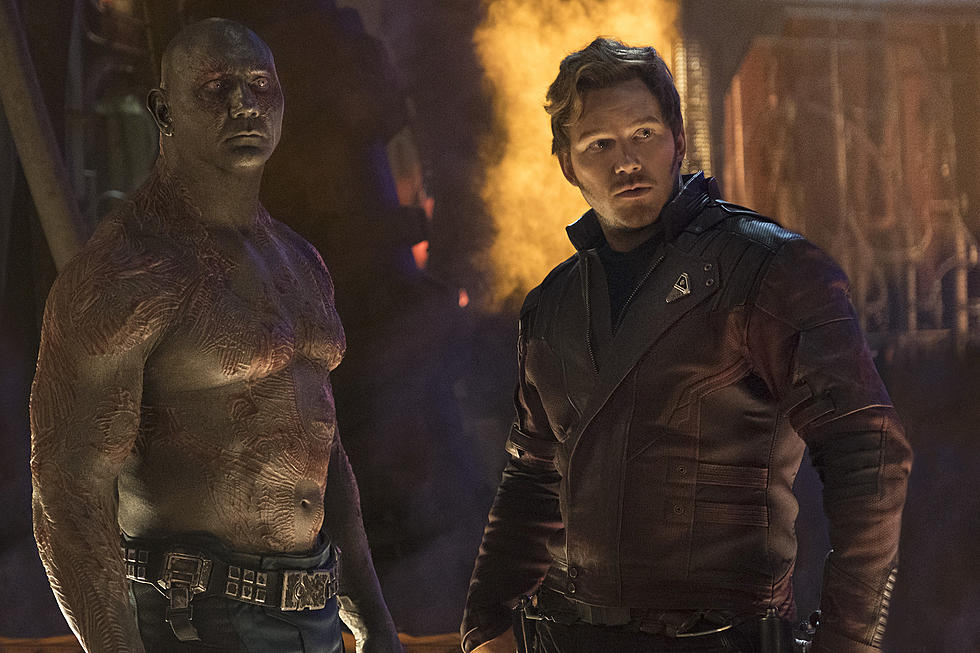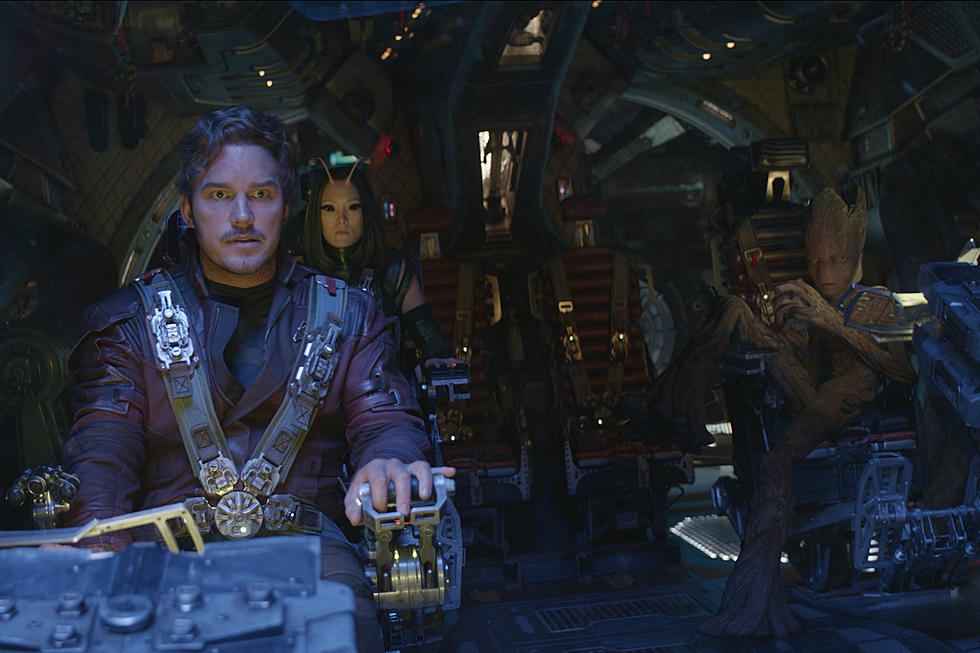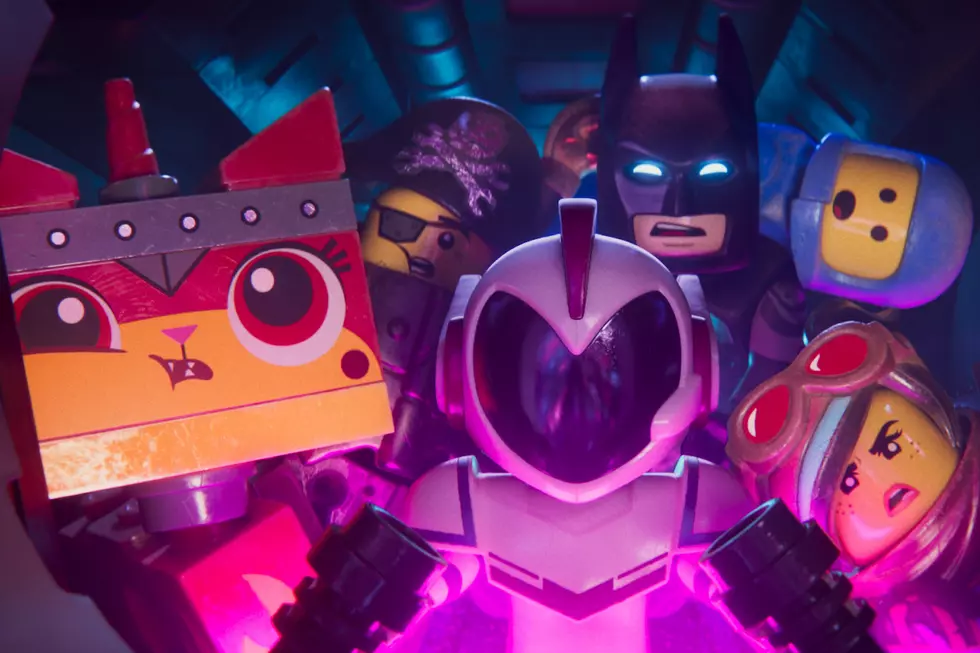
The History of the Marvel Cinematic Universe, Chapter 10: ‘Guardians of the Galaxy’
In The History of the Marvel Cinematic Universe, ScreenCrush editor-in-chief Matt Singer looks back at every film in the MCU to date, leading up to the premiere of Avengers: Infinity War on April 27. Previous chapters can be found here.
Chapter 10: Guardians of the Galaxy
Director: James Gunn
Writers: James Gunn, Nicole Perlman
Release Date: August 1, 2014
U.S. box office: $333.1 million
Worldwide box office: $773.3 million
Rotten Tomatoes rating: 91 percent
Metacritic score: 76
Letterboxd average grade: 3.9
CinemaScore: A
What Holds Up
With its wild visuals and outlandish characters, it’s easy to overlook the fact that the bedrock of Guardians of the Galaxy’s success is its sturdy screenplay by Nicole Perlman and director James Gunn. This movie is about more than talking space raccoons, and it became a surprise blockbuster in the summer of 2014 because its message spoke to people.
Gunn and Perlman’s Guardians of the Galaxy aren’t conventional heroes; they’re self-identified “losers,” who’ve all suffered enormous loss in their lives. Peter “Star-Lord” Quill (Chris Pratt) was kidnapped from Earth on the day his mother died of cancer. Gamora (Zoe Saldana) lived a life of misery as the adopted daughter of the intergalactic conqueror Thanos (Josh Brolin). Drax (Dave Bautista) hasn’t gotten over the murders of his wife and child at the hands of Thanos’ minion Ronan the Accuser (Lee Pace). Rocket (Bradley Cooper) is the result of cruel scientific experiments. And Groot (Vin Diesel) ... okay Groot seems like he has just about everything together except his vocabulary. But he’s the exception.
From its very first scene, Guardians is about the search for meaningful human connection in the universe. That scene, a flashback to Star-Lord’s childhood, takes place in his mother’s hospital room, where Peter refuses to take his mom’s hand as she passes away. 26 years later, after a lifetime as a loner, Peter finally finds a new family with the Guardians. The only way the group can defeat Ronan is by holding hands — by finally accepting the family dynamic that Peter shunned a quarter century earlier — as they collectively unleash the energies of “The Orb,” the film’s MacGuffin, on Ronan.
Everywhere you look in Guardians, you see visual signifiers of this theme about the power of groups over individuals. The space cops of the “Nova Corps” literally join their spaceships together into a giant energy net to contain the approach of Ronan’s ship, the Dark Aster. During this same sequence, Gamora proudly boasts “We’re just like Kevin Bacon!” to Peter, a callback to an earlier scene where he explained the plot of Footloose to her. But the choice of movie and actor is very deliberate, since Kevin Bacon is also synonymous with the game Six Degrees of Kevin Bacon, which is essentially about how every single person in Hollywood (and, by extension, every single human being on Earth) is connected, no matter how disconnected they may seem. These touches are the reason Guardians resonated with audiences, and went on to gross more money than Marvel movies featuring far more well-established characters like Captain America and Thor.
What Doesn’t Hold Up
Nearly four years later, and exactly one month away from the release of Avengers: Infinity War, it is still a little odd that Thanos’ brief supporting role in Guardians of the Galaxy remains the biggest part he’s had in any Marvel Studios movie. Even in hindsight, he sticks out in this movie like a sore thumb. He wants Ronan to get him the Orb because, unbeknownst to Ronan or anyone else somehow, it contains the Power Stone. Ronan gets it, then refuses to hand it over, and Thanos ... does absolutely nothing about it and vanishes from the movie never to be heard from again. Not exactly an impressive debut.
Ten films into the MCU, Guardians finally gives us an explanation of the Infinity Stones, when the Collector (Benicio Del Toro) reveals to Star-Lord and Gamora just what this Orb they’ve been chasing across the universe means.
While it’s sort of fun to see the Tesseract from Captain America and the Aether from Thor: The Dark World in the Collector’s alien PowerPoint presentation, the scene stops the movie’s momentum dead in its tracks. It adds almost nothing to Guardians; it’s only here to serve the larger Marvel mythos. The longer the scene goes, and the more we see of the Collector, the less we understand the post-credits scene from Thor: The Dark World, where the Asgardians foolishly hand the Aether over to the Collector for “safe keeping.”
Basically, everything in Guardians involving Thanos feels like a studio edict rather than an organic product of Perlman and Gunn’s carefully constructed screenplay. Thanos does relate to the film’s large themes about individuals and families (he’s the adopted, abusive dad of both Gamora and Nebula (Karen Gillan)) but there’s no payoff to any of the relationships between those characters; he doesn’t even exchange a single line of dialogue with Gamora. Tellingly, Guardians Vol. 2, made after the first film became a monster hit and Gunn’s stature in Marvel had been raised significantly, has zero Thanos scenes and no Infinity Stones. That movie is better for it.
Coolest Foreshadowing of Future Marvel Events
I’ve already identified a few instances over the course of this column where Marvel clearly didn’t have an endgame in mind for certain characters and stories, dangling plot threads they later contradicted or totally abandoned. That’s not the case in Guardians of Galaxy, where James Gunn clearly had a plan in place for an eventual sequel (2017’s Guardians of the Galaxy Vol. 2) right from the beginning. His teasing of Star-Lord’s mysterious origins are particularly impressive because his version of Star-Lord and his parentage is pretty different than the one in Marvel Comics (where Peter’s dad is a dude named J’son, the emperor of a planet called Spartax).
Everything in Vol. 1 regarding Peter’s knotty family tree jives with what Gunn reveals in Vol. 2; the reason Peter was “kidnapped” from space on the same day his mother died, for example, was because his father had hired the mercenary Yondu (Michael Rooker) to find him. He kept Peter around all those years (even when his crew wanted to eat him) because he knew Peter’s dad was bad news and was trying to protect him as best he could. Looking back at the first Guardians after Vol. 2, Gunn’s meticulous planning is even more striking, and probably the best example of this kind of groundwork laying in the entire Marvel Cinematic Universe.
Best Marvel Easter Egg
Before Spider-Man or the X-Men, before Iron Man or Captain America, the first Marvel character to get his own theatrical feature was ... Howard the Duck, the dimension-spanning, wisequacking hero created by Steve Gerber and Val Mayerik. Howard’s movie, while relatively faithful to the story of the source material, was a huge whiff in terms of its satirical tone, and its animatronic Howard was, frankly, super duper creepy. With all that in mind, no one would have blamed Marvel Studios if they treated Howard like a leper and pretended he never even existed.
And yet there he is in the post-credits scene from Guardians, hanging out in the Collector’s museum after the Infinity Stone has blown it to pieces.
After Howard the Duck became one of the most notorious flops of the 1980s, no one in their right mind would have predicted we’d ever see that character on the big-screen again. (No one would have expected to see a Guardians of the Galaxy movie, for that matter.) Howard’s cameo in Guardians is a fun thrill for Marvel zombies, but it also amounts to a statement from the company that it loves all its characters, no matter how badly other filmmakers might have screwed them up in the past. And it clues fans in to the fact that truly anyone could show up in a Marvel Studios movie, which is very much part of the reason fans love them.
Final Verdict
With 18 movies in the Marvel Cinematic Universe to date, Guardians of the Galaxy sits at an interesting fulcrum point, smack dab in the middle of the studios’ oeuvre. Watching it now, it does feel like a major milestone for Marvel. There was before Guardians, and there was after. It changed the MCU forever.
Before Guardians, Marvel was mostly dedicated to adapting its best-known characters (or at least the best-known characters it still controlled the film rights to). It also focused on straightforward adaptations, steered by well-established filmmakers. Guardians and James Gunn were very much a break from all of that. The Guardians were an obscure property even to a lot of comic-book fans (and Marvel didn’t even adapt their most well-known iteration, a team of space-faring heroes from the year 3000). Gunn was an unconventional choice for an unconventional team. He’d written and directed a few films, almost all of which driven by the sort of caustic wit and bloody violence you would never see in a Marvel movie.
And yet the unusual combination worked. Gunn wasn’t beholden to the Guardians comics in the same way the creators of Captain America or The Incredible Hulk were to theirs, and he expanded the boundaries of what a Marvel movie could be. After Guardians, Marvel seemed much more willing to take chances on lesser-known characters (including Ant-Man, Doctor Strange, and Black Panther) and more eclectic filmmakers, and to embrace a more self-satirizing tone. It’s hard to imagine Taiki Waititi directing a Thor movie where Jeff Goldblum plays an immortal alien who likes to DJ space parties without James Gunn’s Guardians, which ends with the hero challenging the primary villain to a dance-off.
Maybe the key prerequisite on Gunn’s pre-Guardians resume were his scripts for the two live-action Scooby-Doo movies. Whether or not you like those films, the Scooby gang provides a good prototype for the Guardians’ dynamic; they’re a group of lovable misfits who wander around solving crimes, and they have a lot of fun dealing with bad guys that should be scary. The Guardians are literally all that stands between Ronan and the conquest of the galaxy. But with Star-Lord dancing to Redbone, Rocket spouting his impressive vocabulistics, and Drax taking every metaphor extremely literally (“Nothing goes over my head! My reflexes are too fast.”) things don’t get too dark or heavy. Never underestimate how much moviegoers like heroes who laugh in the face of danger.
Shoehorned Thanos scenes aside, Guardians of the Galaxy holds up really well. For a movie about a foulmouthed raccoon who delights in mowing people down with his homemade weapons, it is oddly sentimental. When Groot sacrifices himself to save the rest of the Guardians after a whole movie of repeating “I am Groot” over and over, he looks at his friends sadly and says “We are Groot.” Those three words are Guardians of the Galaxy in a nutshell. They’re a punchline to a running gag and a moment designed to tug at your heartstrings. It’s also an emphatic reminder that this is a movie about a bunch of defiant I’s blending together to become a triumphant we.
More From Idaho’s Talk Station










